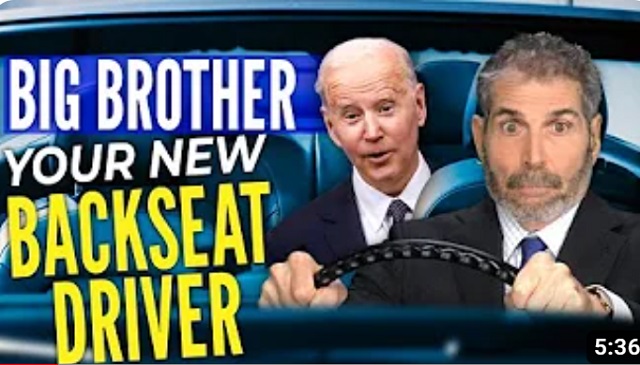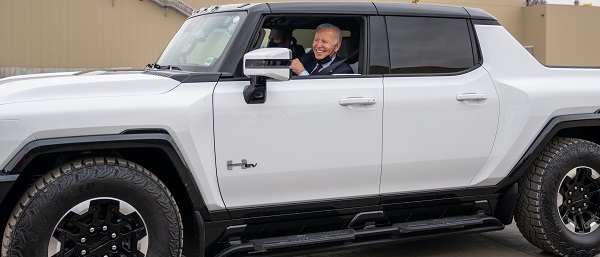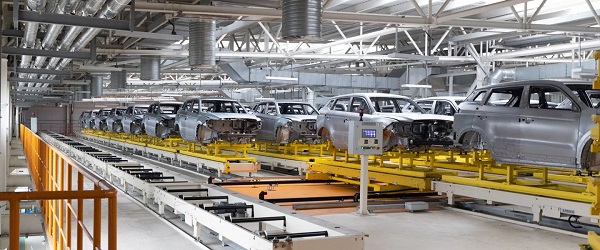Automotive
Biden’s Kill Switch: The Growing Threat of Government Control of Your Car

From StosselTV
The government may soon be able to shut down your car. Biden’s $1.2 trillion infrastructure bill includes a kill switch for new cars.
In an effort to reduce drunk driving, government wants devices in cars that will monitor and limit impaired driving. But there’s a big problem: these devices give government control over your car.
Automotive engineer and former vintage race car driver Lauren Fix points out the dangers in my video.
After 40+ years of reporting, I now understand the importance of limited government and personal freedom.
——————————————
Libertarian journalist John Stossel created Stossel TV to explain liberty and free markets to young people.
Prior to Stossel TV he hosted a show on Fox Business and co-anchored ABC’s primetime newsmagazine show, 20/20.
Stossel’s economic programs have been adapted into teaching kits by a non-profit organization, “Stossel in the Classroom.” High school teachers in American public schools now use the videos to help educate their students on economics and economic freedom. They are seen by more than 12 million students every year.
Stossel has received 19 Emmy Awards and has been honored five times for excellence in consumer reporting by the National Press Club. Other honors include the George Polk Award for Outstanding Local Reporting and the George Foster Peabody Award.
————
To get our new weekly video from Stossel TV, sign up here: https://www.johnstossel.com/#subscribe ————
Automotive
Canada’s EV house of cards is close to collapsing

 By Dan McTeague
By Dan McTeague
Well, Canada’s electric vehicle policies are playing out exactly as I predicted. Which is to say, they’re a disaster.
Back in November, in the immediate aftermath of Donald Trump’s re-election, I wrote in these pages that, whatever else that election might mean for Canada, it would prove big trouble for the Justin Trudeau/Doug Ford EV scam.
The substance of their plot works like so: first, the federal and provincial governments threw mountains of taxpayer dollars in subsidies at automakers so that they’d come to Canada to manufacture EVs. Then Ottawa mandated that Canadians must buy those EVs — exclusively — by the year 2035. That way Ford and Trudeau could pat themselves on the back for “creating jobs,” while EV manufacturers could help themselves to the contents of our wallets twice over.
But the one variable they didn’t account for was a return of Donald Trump to the White House.
Trump had run on a promise to save America from their own back-door EV mandates. Though Kamala Harris had denied that any such mandates existed, they did, and they were founded on two acts of the Biden-Harris administration.
First, they issued an Executive Order setting significantly more onerous tailpipe regulations on all internal combustion engine (ICE) vehicles, with the explicit goal of ensuring that 50 percent of all new vehicles sold in America be electric by 2030.
Second, they granted California a waiver to make those regulations more burdensome still, so that only EVs could realistically be in compliance with them. Since no automaker would want to be locked out of the market of the most populous state, nor could they afford to build one set of cars for California (plus the handful of states which have — idiotically — chosen to align their regulations with California’s) and another set for the rest of the country, they would be forced to increase their manufacture and sale of EVs and decrease their output of ICE vehicles.
Trump’s victory took Canada’s political class completely by surprise, and it threw a spanner into the workings of the Liberals’ plan.
That’s because there just aren’t enough Canadians, or Canadian tax dollars, to make their EV scheme even kinda’ work. Canada’s unique access to the world’s biggest market — America — was a key component of the plan.
After all, vehicles are “the second largest Canadian export by value, at $51 billion in 2023, of which 93 percent was exported to the US,” according to the Canadian Vehicle Manufacturers Association, and “Auto is Ontario’s top export at 28.9 percent of all exports (2023.)”
It further depended on Americans buying more and more EVs every year. But since, when given a choice, most people prefer the cost and convenience of ICE vehicles, this would only work if Americans were pushed into buying EVs, even if in a more roundabout way than they’re being forced on Canadians.
Which is why the plan all began to unravel on January 20, the day of Trump’s inauguration, when he signed Executive Order 14154, “Unleashing American Energy,” which, among other things, rescinded Joe Biden’s pro-EV tailpipe regulations. And it has continued downhill from there.
Just last week, the US Senate voted to repeal the Biden EPA’s waiver for California. Not that that’s the end of the story — in the aftermath of the vote, California governor Gavin Newsom vowed “to fight this unconstitutional attack on California in court.” (Though don’t be surprised if that fight is brief and half-hearted — Newsom has been trying to leave his lifelong leftism behind recently and rebrand as a moderate Democrat in time for his own run at the White House in 2028. Consequently, being saved from his own EV policy might only help his career prospects going forward.)
But it’s worth noting the language used by the Alliance for Automotive Innovation, which represents car companies like Toyota, GM, Volkswagen and Stellantis (several of whom, it should be noted, have received significant subsidies from the Liberal and Ford governments to manufacture EVs), which said in a statement, “The fact is these EV sales mandates were never achievable.”
That’s worth repeating: these EV sales mandates were never achievable!
That’s true in California, and it’s true in Canada as well.
And yet, our political class has refused to accept this reality. Doug Ford actually doubled down on his commitment to heavily subsidizing the EV industry in his recent campaign, saying “I want to make it clear… a re-elected PC government will honour our commitment to invest in the sector,” no matter what Donald Trump does.
Except, as noted above, Donald Trump represents the customers Doug Ford needs!
Meanwhile, our environmentalist-in-chief, Mark Carney, has maintained the Liberal Party’s commitment to the EV mandates, arguing that EVs are essential for his vacuous plan of transforming Canada into a “clean energy superpower.” How exactly? That’s never said.
These are the words of con artists, not men who we should be trusting with the financial wellbeing of our country. Unfortunately, in our recent federal election — and the one in Ontario — this issue was barely discussed, beyond an 11th-hour attempted buzzer-beater from Pierre Poilievre and a feeble talking point from Bonnie Crombie about her concern “that the premier has put all our eggs in the EV basket.”
Meanwhile, 2035 is just around the corner.
So we can’t stop calling attention to this issue. In fact, we’re going to shout about our mindless EV subsidies and mandates from the rooftops until our fellow Canadians wake up to the predicament we’re in. It took some time, but we made them notice the carbon tax (even if the policy change we got from Carbon Tax Carney wasn’t any better.) And we can do it with electric vehicles, too.
Because we don’t have the money, either as a nation or as individuals, to prop this thing up forever.
Dan McTeague is President of Canadians for Affordable Energy.
Automotive
EV fantasy losing charge on taxpayer time

From the Fraser Institute
By Kenneth P. Green
The vision of an all-electric transportation sector, shared by policymakers from various governments in Canada, may be fading fast.
The latest failure to charge is a recent announcement by Honda, which will postpone a $15 billion electric vehicle (EV) project in Ontario for two years, citing market demand—or lack thereof. Adding insult to injury, Honda will move some of its EV production to the United States, partially in response to the Trump Tariff Wars. But any focus on tariffs is misdirection to conceal reality; failures in the electrification agenda have appeared for years, long before Trump’s tariffs.
In 2023, the Quebec government pledged $2.9 billion in financing to secure a deal with Swedish EV manufacturer NorthVolt. Ottawa committed $1.34 billion to build the plant and another $3 billion worth of incentives. So far, per the CBC, the Quebec government “ invested $270 million in the project and the provincial pension investor, the Caisse de dépôt et placement du Québec (CDPQ), has also invested $200 million.” In 2024, NorthVolt declared bankruptcy in Sweden, throwing the Canadian plans into limbo.
Last month, the same Quebec government announced it will not rescue the Lion Electric company from its fiscal woes, which became obvious in December 2024 when the company filed for creditor protection (again, long before the tariff war). According to the Financial Post, “Lion thrived during the electric vehicle boom, reaching a market capitalization of US$4.2 billion in 2021 and growing to 1,400 employees the next year. Then the market for electric vehicles went through a tough period, and it became far more difficult for manufacturers to raise capital.” The Quebec government had already lost $177 million on investments in Lion, while the federal government lost $30 million, by the time the company filed for creditor protection.
Last year, Ford Motor Co. delayed production of an electric SUV at its Oakville, Ont., plant and Umicore halted spending on a $2.8 billion battery materials plant in eastern Ontario. In April 2025, General Motors announced it will soon close the CAMI electric van assembly plant in Ontario, with plans to reopen in the fall at half capacity, to “align production schedules with current demand.” And GM temporarily laid off hundreds of workers at its Ingersoll, Ontario, plant that produces an electric delivery vehicle because it isn’t selling as well as hoped.
There are still more examples of EV fizzle—again, all pre-tariff war. Government “investments” to Stellantis and LG Energy Solution and Ford Motor Company have fallen flat and dissolved, been paused or remain in limbo. And projects for Canada’s EV supply chain remain years away from production. “Of the four multibillion-dollar battery cell manufacturing plants announced for Canada,” wrote automotive reporter Gabriel Friedman, “only one—a joint venture known as NextStar Energy Inc. between South Korea’s LG Energy Solution Ltd. and European automaker Stellantis NV—progressed into even the construction phase.”
What’s the moral of the story?
Once again, the fevered dreams of government planners who seek to pick winning technologies in a major economic sector have proven to be just that, fevered dreams. In 2025, some 125 years since consumers first had a choice of electric vehicles or internal combustion vehicles (ICE), the ICE vehicles are still winning in economically-free markets. Without massive government subsidies to EVs, in fact, there would be no contest at all. It’d be ICE by a landslide.
In the face of this reality, the new Carney government should terminate any programs that try to force EV technologies into the marketplace, and rescind plans to have all new light-duty vehicle sales be EVs by 2035. It’s just not going to happen, and planning for a fantasy is not sound government policy nor sound use of taxpayer money. Governments in Ontario, Quebec and any other province looking to spend big on EVs should also rethink their plans forthwith.
-

 Crime1 day ago
Crime1 day agoHow Chinese State-Linked Networks Replaced the Medellín Model with Global Logistics and Political Protection
-

 Addictions1 day ago
Addictions1 day agoNew RCMP program steering opioid addicted towards treatment and recovery
-

 Aristotle Foundation2 days ago
Aristotle Foundation2 days agoWe need an immigration policy that will serve all Canadians
-

 Business1 day ago
Business1 day agoNatural gas pipeline ownership spreads across 36 First Nations in B.C.
-

 Courageous Discourse1 day ago
Courageous Discourse1 day agoHealthcare Blockbuster – RFK Jr removes all 17 members of CDC Vaccine Advisory Panel!
-

 Business14 hours ago
Business14 hours agoEU investigates major pornographic site over failure to protect children
-

 Health1 day ago
Health1 day agoRFK Jr. purges CDC vaccine panel, citing decades of ‘skewed science’
-

 Censorship Industrial Complex1 day ago
Censorship Industrial Complex1 day agoConservatives slam Liberal bill to allow police to search through Canadians’ mail


